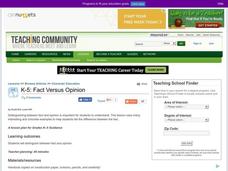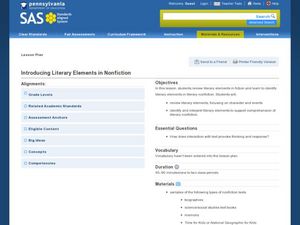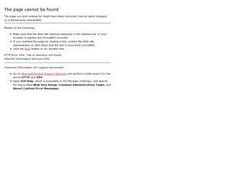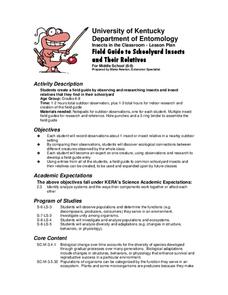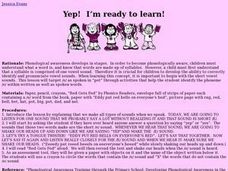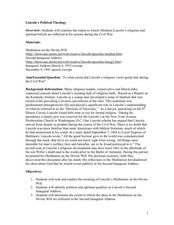Curated OER
Reading With Fluency And Expression
Practice makes perfect, and this lesson provides a rubric to prove it! To improve their ability to read with fluency and expression, readers listen to a series of online stories in order to hear how a well-read story should sound. They...
Curated OER
Fact Versus Opinion
Students differentiate between fact and opinion. They define fact and opinion, then listen to and identify examples of each. Students identify different books where facts and opinions can be found, and cut out newspaper and magazine...
Curated OER
Summarizing with James and the Giant Peach
Elementary readers in literature groups practice summarizing chapter-by-chapter with Roald Dahl's James and the Giant Peach. Focus on main idea, supporting details, and the 5 Ws. Unfortunately, a clever "peach" graphic organizer to which...
Curated OER
Dig A Little Deeper
Here is a great lesson on recognizing events and themes in a story. Students read chapters from a chosen book and then fill out a graphic organizer to further explore the purpose of the chapter. They write the events, themes, author's...
Curated OER
Introducing Literacy Elements in Nonfiction
Explore nonfiction writing with your class. They will identify elements in nonfiction by reviewing elements of fiction. Then they use biographies, memoirs, menus, Time for Kids, and text books to identify elements of nonfiction. They...
Virginia Department of Education
Synthesizing to Support a Thesis- Big Picture Emphasis
Help your researchers as they begin to develop a topic for research with these worksheets. Included are two nicely designed graphic organizers that assist students in narrowing and researching their topic, and an efficient...
Curated OER
Writing Learning Logs
Students read a book about Abraham Lincoln. Using a log, they write factual information from the book. As a class, they discuss what they believe childhood was like in the middle to late 1800s. They fill out a KWL chart before beginning...
Curated OER
The Lives of the People: To Understand the People is to Understand the Times
Students examine the time period of the Great Depression. Using primary source documents, they read excerpts of interviews done by author Studs Terkel for one of his books. They practice interviewing their partner in front of the class...
Curated OER
Introduction to E-Discussion
Here's an interesting way to incorporate technology into your classroom. Have your young readers conduct an e-discussion of a story they are currently reading. Learners can post and/or respond to the comments of others reading the same...
Curated OER
Beary O'Mometer Learns About Careers In Meteorology
Students explore the field of meteorology. In this meteorology lesson, students explore weather-related careers as they research the field of study as well as various weather concepts. Students interview meteorologists, write business...
Curated OER
Publishing Stories: Beginning, Middle, End
First and second graders explore the importance of having a beginning, middle, and end when writing stories. In this story writing instructional activity, students write short stories using the story diamond as a guide. They invite their...
Curated OER
Time Capsule: Oral Presentation
A great way to gain proficiency when learning a new language is to prepare an oral presentation. In this foreign language lesson, pairs collaborate to develop a Time Capsule which they present to their class using their target...
Curated OER
Tyrone, the Horrible
Read a Hans Wilhelm story and complete creative writing activities. Start by reading Tyrone, the Horrible and discuss the behavior in the book. Then split your class into groups to create a "bully" situation and discuss possible...
Curated OER
Inequalities and The Order of Operations
Middle and high schoolers investigate how to solve inequalities. The lesson has a good guide for taking pupils through a direct instruction of the concept. You can use counting tiles in order to help kinesthetic learners.
Curated OER
Field Guide to Schoolyard Insects and Their Relatives
Your entire class works together to create an illustrated insect field guide. The intent is that they venture outside of the classroom, find a critter, and then research it using reference materials, insect books, and the Internet for...
Curated OER
Stereotyping of Native Americans
Here is a lesson that covers the stereotyping of Native Americans in American culture is here for you. Learners see that there are many instances of stereotyping that are an accepted part of our society. After a lengthy discussion, a...
Curated OER
UV light & Ozone layer
Middle-school meteorologists absorb information about ultraviolet radiaton and consider the ozone layer. The book that learners are supposed to refer to is not available, so you might want to locate some graphics or posters...
Curated OER
Yep, I'm Ready to Learn!
Tongue twisters give young learners an easy phrase to refer back to when learning letter sounds. Use the phrase "Eddy put red bells on everyone's bed" to identify the /e/ sound. Then read Red Gets Fed aloud, having learners nod...
Curated OER
Sea Changes: A New England Industry
Young scholars conduct research in order to use primary and secondary sources. They interpret and analyze information from textbooks and nonfiction books for young adults, as well as reference materials, audio and media presentations,...
Curated OER
Create a PowerPoint:Based on The Giver
Are you reading Lois Lowry's The Giver in your language arts class? Have your young readers create a PowerPoint presentation about their life, and how they connect to the lives of the characters from the novel. They present information...
Curated OER
Lincoln’s Political Theology
Students consider the weight of Lincoln's spiritual life on his political life. In this Abraham Lincoln instructional activity, students read excerpts from speeches delivered by Lincoln and determine whether they reveal information about...
Novelinks
The Devil’s Arithmetic: Concept Analysis
A helpful guide to Jane Yolen's The Devil's Arithmetic for your literature unit. Use the sections on point-of-view, dramatic irony, and background knowledge, among others, to frame your lessons in an engaging and educational way.
Curated OER
World War II Time Line
Students locate information on WWII in reference books. They as a group place key events of WWII in appropriate sequence on a time line and discuss key events that occurred during WWII as a class.
Curated OER
Omaha's Whose Who at Prospect Hill Cemetery
Middle schoolers explore and are able to explain how to read an old street map of downtown Omaha. Students review the names of schools in OPS as well as country names in Nebraska. They find out the names of graves in Prospect Hill...

